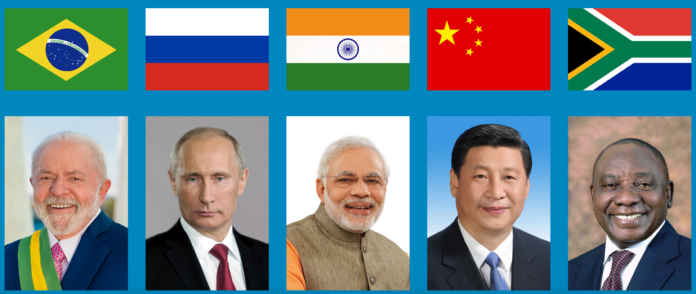
by Riccardo Cacelli
City of London – The annual summit of the BRICS countries ended yesterday in South Africa. We analyze the decisions taken, the strategic directions and the geopolitical future in relation to the new multipolar world order.
We must know that BRICS is a partnership of five leading emerging markets and developing countries, founded on historical bonds of friendship, solidarity and shared interests. Together, the Federative Republic of Brazil, the Russian Federation, the Republic of India, the People’s Republic of China and the Republic of South Africa represent over 42% of the global population, 30% of the world’s territory, 23% of GDP and 18 % of global trades.

We also need to know that the BRICS are a partnership of influential countries that support inclusive multilateralism.
A reformed UN is at the heart of a shared BRICS vision of a restructured global political, economic and financial architecture that reflects the contemporary world and is more equitable, balanced and representative.
The BRICS affirmed their inclusive and representative vision of reform in the Joint Declaration on Strengthening and Reforming the Multilateral System, adopted in 2021. Other BRICS security mechanisms include dialogue and sharing of best practices in the areas of counter-terrorism, cyber security, of the transnational organization cooperation against crime, the fight against drugs and the fight against corruption.
Yesterday’s main decision was to expand the membership by allowing the entry of 6 new countries.
They are: Argentina, Ethiopia, Iran, Saudi Arabia, Egypt and the UAE are to become full members from 1 January 2024.
The purpose of this decision is part of the plan to build a “multipolar” world order that will give weight to the hitherto subdued voices of the Global South and bring them to the center of the global agenda.
However, the Chinese initiative to also include Pakistan as a new member state was rejected due to strong opposition from India.
Now let’s see the data regarding the surface area and population of new members:
- Argentina: surface area 2,780,400 km², population 47 million;
- Egypt: surface area 1,010,000 km², population 107 million;
- Ethiopia: surface area 1,104,300 km², population 105 million;
- Saudi Arabia: surface area 2,149,690 km², population 32 million;
- United Arab Emirates: area 83,600 km², population 9 million;
- Iran: surface area 1,648,195 km², population 88 million.
These countries together have a global area of: 87,761,185 km² and a population of 446 million inhabitants.
Let’s make a comparison and see the data from the European Union: surface area 4,233,262 km², population 447 million.
So the new BRICS countries together have an area 20 times larger than the European Union and the same population (447M).
Let us now read and analyze what Foreign Minister Sergey Lavrov wrote on the eve of the BRICS summit.
“Today tectonic changes are taking place in the world. The possibility of domination by one country or even a small group of states is disappearing. The model of international development built on the exploitation of the resources of the World Majority to maintain the welfare of the “billion d’oro” is hopelessly outdated. It does not reflect the aspirations of all mankind.”
 Lavrov continues: “We are witnessing the emergence of a more just multipolar world order. New centers of economic growth and global decision-making on important political issues in Eurasia, Asia-Pacific, the Middle East, Africa and Latin America are led mainly by their own interests and attach fundamental importance to national sovereignty. And in this context they achieve impressive success in various areas.”
Lavrov continues: “We are witnessing the emergence of a more just multipolar world order. New centers of economic growth and global decision-making on important political issues in Eurasia, Asia-Pacific, the Middle East, Africa and Latin America are led mainly by their own interests and attach fundamental importance to national sovereignty. And in this context they achieve impressive success in various areas.”
Lavrov now writes about dedollarization:
“Attempts by the “collective West” to reverse this trend with the aim of preserving its hegemony have exactly the opposite effect. The international community is tired of the blackmail and pressure of Western elites and their colonial and racist attitudes. That is why, for example, not only Russia, but also numerous other countries are steadily reducing their dependence on the US dollar, switching to alternative payment systems and settlements in the national currency. I recall the wise words of Nelson Mandela : “When the water begins to boil it is senseless to put out the fire. And it really is.“
Let’s stop here.
The decline of the dollar now seems unstoppable and the new world order is moving fast.
This century will see radical changes in geopolitics and in the role of the countries colonized in previous centuries for the construction of the multipolar world.
Their awareness combined with natural rice, their culture and the desire for redemption are the main ingredients of the next decades.
Here the full text of what Sergey Lavrov wrote.
To complete the knowledge of the topic covered in my analysis, I recommend that you also read:
-
Multipolarism, the new world order (political, economic, financial and social) that Russia is building together with other countries
-
The Concept of the Foreign Policy of the Russian Federation
- Dedollarization: is the war in Ukraine being fought for this?
The next analysis concerns the text of the final declaration of the summit.
There are 91 points to read and study carefully.
If you believe, follow me in my analysis.
Thanks for reading what I wrote.
Riccardo Cacelli
r.cacelli@cacelli.com
https://www.facebook.com/riccardocacellipage/


